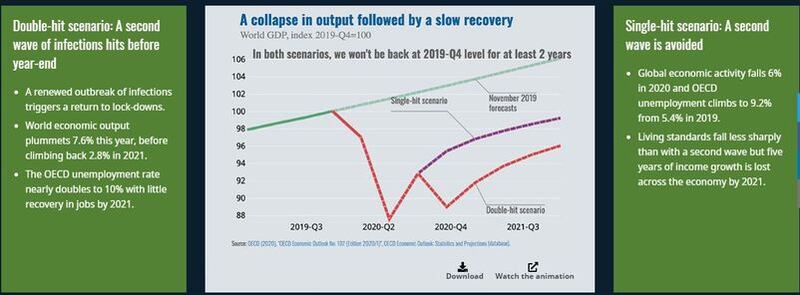The British economy is set to be the hardest hit by coronavirus among the world’s developed countries, according to the Organisation for Economic Co-operation and Development (OECD).
But the economic impact of the coronavirus crisis is "dire everywhere," OECD said in its latest global economic outlook. The pandemic is on track to cause the worst recession outside of wartime in 100 years.
“The recovery will be slow and the crisis will have long-lasting effects, disproportionately affecting the most vulnerable people.”
The OECD predicted Britain’s economy was likely to slump by 11.5% in 2020.
But it warned that if there was a second peak of the Covid-19 pandemic, the British economy could contract by 14% this year.
The OECD published two forecasts for global growth: the first assuming there is a second wave of Covid-19 infections; the second assuming a second wave is avoided.
A double-hit scenario where there is a second wave of Covid-19 would see global GDP drop by 7.6% and the recovery would be even slower next year, the OECD predicted.
If a second wave is avoided then the world economy will contract by 6%, with all countries suffering a deep recession and cautioned that the recovery will be slow.

OECD chief economist Laurence Boone said: “Both scenarios are sobering, as economic activity does not and cannot return to normal under these circumstances.
“By the end of 2021, the loss of income exceeds that of any previous recession over the last 100 years outside wartime, with dire and long-lasting consequences for people, firms and governments.”
She added: “Extraordinary policies will be required to walk the tightrope towards recovery.
“Even if growth does surge in some sectors, overall activity will remain muted for a while.
“Governments can provide the safety nets that allow people and firms to adjust, but cannot uphold private sector activity, employment and wages for a prolonged period.”
The OECD also warned about the impact of the pandemic on young people. Those aged between 15 and 24 represent the biggest share of workers in the hardest-hit sectors, such as tourism.
Main points:
- If there is a second wave of the coronavirus, the OECD said global growth will contract by 7.6% in 2020, and “remain well short” of its pre-crisis level by the end of next year.
- France, the United Kingdom, Spain and Italy are expected to face the sharpest economic contractions this year.
- Growth in the United States is also expected to contract by 7.3% in the single-hit scenario and by 8.5% if there’s a second wave.
WATCH NOW | The global economy faces a tightrope walk to #recovery: Our Secretary-General @A_Gurria & Chief Economist @LauBooneEco present the latest OECD #EconomicOutlook ?? https://t.co/8yKFkPn8XD https://t.co/UK5jXQMEf4
— OECD ?? Better policies for better lives (@OECD) June 10, 2020
With or without a second #COVID19 outbreak, the consequences will be severe & long-lasting.
— OECD ?? Better policies for better lives (@OECD) June 10, 2020
Strengthening healthcare systems and supporting people & businesses to help adapt to a changing world will be crucial. See our recommendations ?? https://t.co/HLrGXh0cRN #EconomicOutlook pic.twitter.com/eMsQKLc2KD








